论语_学而第一_英文翻译
《论语》中英文对照版

论语 CONFUCIAN ANALECTS学而第一『⒈1』子曰:“学而时习之,不亦说乎?有朋自远方来,不亦乐乎?人不知而不愠,不亦君子乎?”The Master said: "Is it not pleasant to learn with a constant perseverance and application? "Is it not delightful to have friends coming from distant quarters? "Is he not a man of complete virtue, who feels no discomposure though men may take no note of him?"『⒈2』有子曰:“其为人也孝弟,而好犯上者,鲜矣;不好犯上,而好作乱者,未之有也。
君子务本,本立而道生。
孝弟也者,其为仁之本与!”The philosopher Yu said, "They are few who, being filial and fraternal, are fond of offending against their superiors. There have been none, who, not liking to offend against their superiors, have been fond of stirring up confusion. "The superior man bends his attention to what is radical. That being established, all practical courses naturally grow up. Filial piety and fraternal submission,-are they not the root of all benevolent actions?"『⒈3』子曰:“巧言令色,鲜矣仁!”The Master said, "Fine words and an insinuating appearance are seldom associated with true virtue."『⒈4』曾子曰:“吾日三省吾身——为人谋而不忠乎?于朋友交而不信乎?传不习乎?”The philosopher Tsang said, "I daily examine myself on three points:-whether, in transacting business for others, I may have been not faithful;-whether, in intercourse with friends, I may have been not sincere;-whether I may have not mastered and practiced the instructions of my teacher."『⒈5』子曰:“道千乘之国,敬事而信,节用而爱人,使民以时。
论语-学而篇一中英文对照
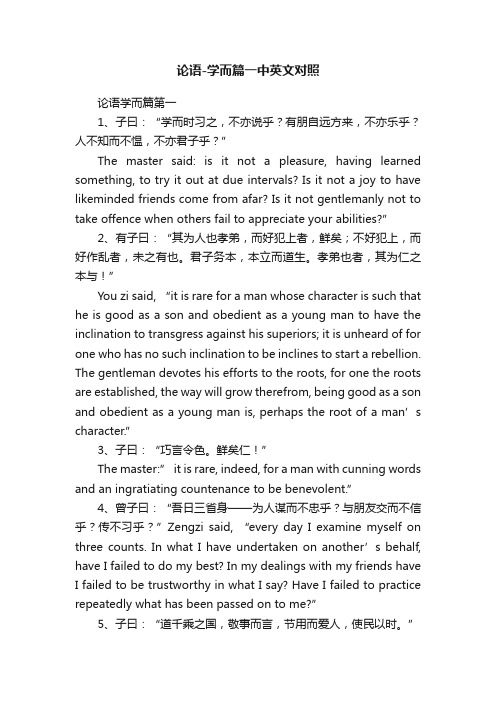
论语-学而篇一中英文对照论语学而篇第一1、子曰:“学而时习之,不亦说乎?有朋自远方来,不亦乐乎?人不知而不愠,不亦君子乎?”The master said: is it not a pleasure, having learned something, to try it out at due intervals? Is it not a joy to have likeminded friends come from afar? Is it not gentlemanly not to take offence when others fail to appreciate your abilities?”2、有子曰:“其为人也孝弟,而好犯上者,鲜矣;不好犯上,而好作乱者,未之有也。
君子务本,本立而道生。
孝弟也者,其为仁之本与!”You zi said, “it is rare for a man whose character is such that he is good as a son and obedient as a young man to have the inclination to transgress against his superiors; it is unheard of for one who has no such inclination to be inclines to start a rebellion. The gentleman devotes his efforts to the roots, for one the roots are established, the way will grow therefrom, being good as a son and obedient as a young man is, perhaps the root of a man’s character.”3、子曰:“巧言令色。
《论语》之《学而第一》原文+翻译(分段)(全)

《论语》之《学而第一》原文+翻译(分段)(全)【原文】子曰:“学而时习①之,不亦说②乎?有朋自远方来,不亦乐乎?人不知而不愠③,不亦君子乎?”【注释】①习:温习。
②说:通“悦”,愉快。
③愠:恼怒。
【译文】孔子说:“学习知识后按时温习并实践练习,不也是很愉快的吗?有朋友从远方来,不也是很快乐的吗?别人不了解我,我也不恼怒,不也是品格高尚的人吗?”【原文】有子曰:“其①为人也孝悌②,而好犯上者,鲜矣;不好犯上而好作乱者,未之有也。
君子务③本④,本立而道⑤生。
孝弟也者,其为仁之本与!”【注释】①其:应该。
②孝:孝顺父母,悌:顺从兄长。
③务:专心致力于某事。
④本:根本、基础。
⑤道:规范、秩序。
【译文】有子说:“如果做人孝顺父母、尊敬兄长,却喜欢冒犯上级的人,是很少的。
不喜欢冒犯上级,却喜欢造反的人是没有的。
君子专心致力于事务的根本,根本建立了,道德规范、秩序就产生了。
孝顺父母、尊敬兄长这些,应该是仁的根本啊!”【原文】子曰:“巧言令①色,鲜矣仁!”【注释】①令:美善。
【译文】孔子说:“花言巧语,讨好的表情,(这种人的)仁心就很少了。
”【原文】曾子曰:“吾日三省①吾身②:为人谋而不忠③乎?与朋友交而不信④乎?传不习乎?”【注释】①省:反省。
②身:自身。
③忠:尽心竭力。
④信:诚实。
【译文】曾子说:“我每天多次反省自己:为别人办事是不是尽心竭力了呢?同朋友交往是不是诚实可信了呢?(老师)传授(的知识)是不是温习了呢?”【原文】子曰:“道①千乘之国,敬②事而信③,节用而爱人,使民以时④。
”【注释】①道:治理。
②敬:慎重、严肃。
③信:守信。
④以时:根据时节。
【译文】孔子说:“治理一个拥有一千辆兵车的国家,要严谨认真地办事而且(恪守)信用,节约财政开支而且爱护官吏,役使百姓要不误农时。
”【原文】子曰:“弟子入则孝,出则弟,谨①而信,泛爱众,而亲②仁,行有余力,则以学文③。
”【注释】①谨:谨慎。
②亲:亲近。
③文:文献、知识。
论语-学而篇一中英文对照

论语学而篇第一1、子曰:“学而时习之,不亦说乎?有朋自远方来,不亦乐乎?人不知而不愠,不亦君子乎?”The master said: is it not a pleasure, having learned something, to try it out at due intervals? Is it not a joy to have likeminded friends come from afar? Is it not gentlemanly not to take offence when others fail to appreciate your abilities?”2、有子曰:“其为人也孝弟,而好犯上者,鲜矣;不好犯上,而好作乱者,未之有也。
君子务本,本立而道生。
孝弟也者,其为仁之本与!”You zi said, “it is rare for a man whose character is such that he is good as a son and obedient as a young man to have the inclination to transgress against his superiors; it is unheard of for one who has no such inclination to be inclines to start a rebellion. The gentleman devotes his efforts to the roots, for one the roots are established, the way will grow therefrom, being good as a son and obedient as a young man is, perhaps the root of a man’s character.”3、子曰:“巧言令色。
论语英译比较之学而篇
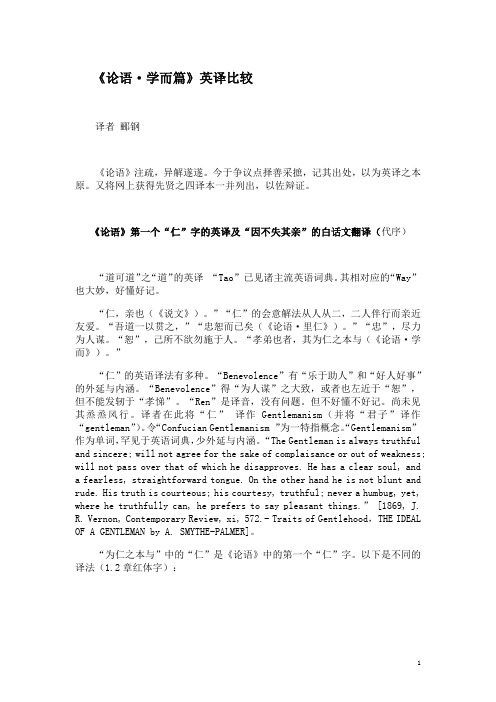
《论语·学而篇》英译比较译者郦钢《论语》注疏,异解遂遂。
今于争议点择善采摭,记其出处,以为英译之本原。
又将网上获得先贤之四译本一并列出,以佐辩证。
《论语》第一个“仁”字的英译及“因不失其亲”的白话文翻译(代序)“道可道”之“道”的英译“Tao”已见诸主流英语词典。
其相对应的“Way”也大妙,好懂好记。
“仁,亲也(《说文》)。
”“仁”的会意解法从人从二,二人伴行而亲近友爱。
“吾道一以贯之,”“忠恕而已矣(《论语·里仁》)。
”“忠”,尽力为人谋。
“恕”,己所不欲勿施于人。
“孝弟也者,其为仁之本与(《论语·学而》)。
”“仁”的英语译法有多种。
“Benevolence”有“乐于助人”和“好人好事”的外延与内涵。
“Benevolence”得“为人谋”之大致,或者也左近于“恕”,但不能发轫于“孝悌”。
“Ren”是译音,没有问题。
但不好懂不好记。
尚未见其烝烝风行。
译者在此将“仁”译作Gentlemanism(并将“君子”译作“gentleman”)。
令“Confucian Gentlemanism”为一特指概念。
“Gentlemanism”作为单词,罕见于英语词典,少外延与内涵。
“The Gentleman is always truthful and sincere; will not agree for the sake of complaisance or out of weakness; will not pass over that of which he disapproves. He has a clear soul, and a fearless, straightforward tongue. On the other hand he is not blunt and rude. His truth is courteous; his courtesy, truthful; never a humbug, yet, where he truthfully can, he prefers to say pleasant things.” [1869, J. R. Vernon, Contemporary Review, xi, 572.- Traits of Gentlehood,THE IDEAL OF A GENTLEMAN by A. SMYTHE-PALMER]。
论语英文翻译
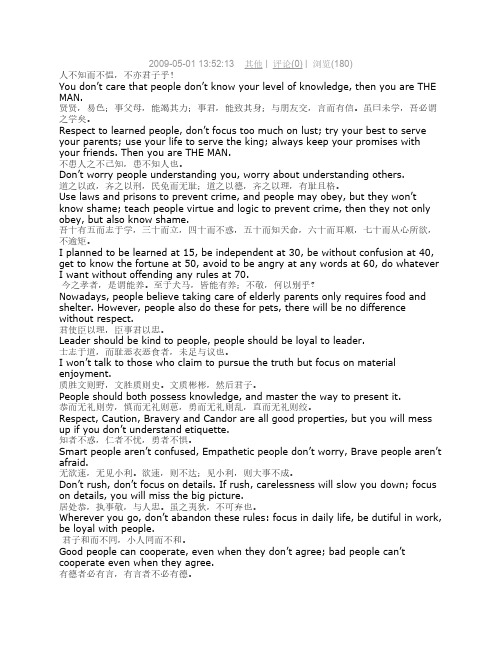
2009-05-01 13:52:13 其他 | 评论(0) | 浏览(180)人不知而不愠,不亦君子乎!You don’t care that people don’t know your level of knowledge, then you are THE MAN.贤贤,易色;事父母,能竭其力;事君,能致其身;与朋友交,言而有信。
虽曰未学,吾必谓之学矣。
Respect to learned people, don’t focus too much on lust; try your best to serve your parents; use your life to serve the king; always keep your promises with your friends. Then you are THE MAN.不患人之不己知,患不知人也。
Don’t worry people understanding you, worry about understanding others.道之以政,齐之以刑,民免而无耻;道之以德,齐之以理,有耻且格。
Use laws and prisons to prevent crime, and people may obey, but they won’t know shame; teach people virtue and logic to prevent crime, then they not only obey, but also know shame.吾十有五而志于学,三十而立,四十而不惑,五十而知天命,六十而耳顺,七十而从心所欲,不逾矩。
I planned to be learned at 15, be independent at 30, be without confusion at 40, get to know the fortune at 50, avoid to be angry at any words at 60, do whatever I want without offending any rules at 70.今之孝者,是谓能养。
论语十二章翻译全文 论语学而篇原文及翻译
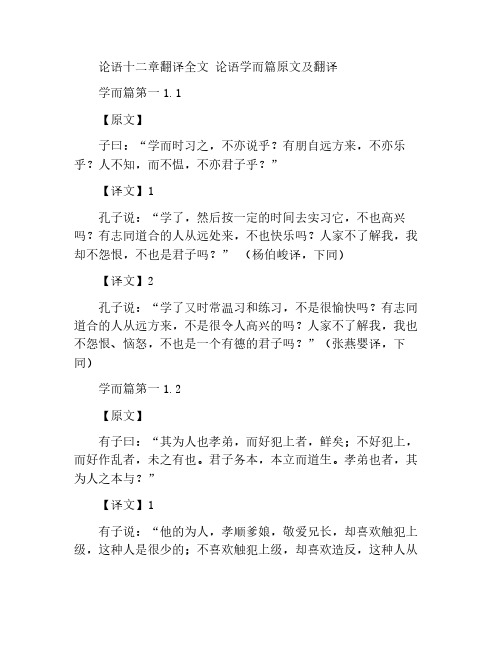
论语十二章翻译全文论语学而篇原文及翻译学而篇第一1.1【原文】子曰:“学而时习之,不亦说乎?有朋自远方来,不亦乐乎?人不知,而不愠,不亦君子乎?”【译文】1孔子说:“学了,然后按一定的时间去实习它,不也高兴吗?有志同道合的人从远处来,不也快乐吗?人家不了解我,我却不怨恨,不也是君子吗?”(杨伯峻译,下同)【译文】2孔子说:“学了又时常温习和练习,不是很愉快吗?有志同道合的人从远方来,不是很令人高兴的吗?人家不了解我,我也不怨恨、恼怒,不也是一个有德的君子吗?”(张燕婴译,下同)学而篇第一1.2【原文】有子曰:“其为人也孝弟,而好犯上者,鲜矣;不好犯上,而好作乱者,未之有也。
君子务本,本立而道生。
孝弟也者,其为人之本与?”【译文】1有子说:“他的为人,孝顺爹娘,敬爱兄长,却喜欢触犯上级,这种人是很少的;不喜欢触犯上级,却喜欢造反,这种人从来没过。
君子专心致力于基础工作,基础树立了,‘道’就会产生。
孝顺爹娘,敬爱兄长,这就是‘仁’的基础吧!”【译文】2有子说:”孝顺父母,顺从兄长,而喜好触犯上层统治者,这样的人是很少见的。
不喜好触犯上层统治者,而喜好造反的人是没有的。
君子专心致力于根本的事务,根本建立了,治国做人的原则也就有了。
孝顺父母、顺从兄长,这就是仁的根本啊!”学而篇第一1.3【原文】子曰:“巧言令色,鲜矣仁!”【译文】1孔子说:“花言巧语,伪善的面貌,这种人,‘仁德’是不会多的。
”【译文】2孔子说:“花言巧语,装出和颜悦色的样子,这种人的仁心就很少了。
”学而篇第一1.4【原文】曾子曰:“吾日三省吾身——为人谋而不忠乎?与朋友交而不信乎?传不习乎?”【译文】1曾子说:“我每天多次自己反省:替别人办事是否尽心竭力了呢?同朋友往来是否诚实呢?老师传授我的学业是否复习了呢?”【译文】2曾子说:“我每天多次反省自己,为别人办事是不是尽心竭力了呢?同朋友交往是不是做到诚实可信了呢?老师传授给我的学业是不是复习了呢?”学而篇第一1.5【原文】子曰:“道千乘之国,敬事而信,节用而爱人,使民以时。
学而篇第一

《论语》译文中英对照学而第一篇:孔子说:【学习以后,能在一定的时候温习它,不也感到很高兴吗?有志同道合的人从远方来,不也感到很快乐吗?别人不理解我,我却不埋怨,不也是以为有教养的君子吗?】Confucius said: [after you studies, you review don’t you also very happy? There are like-minded people from afar, not also feel very happy? Other people don't understand me, but I don't complain, don't think educated gentleman, too?]有子说:【如果一个人能够孝顺父母,尊敬兄长,却喜欢冒犯上级,这种情况是很少有的;不喜欢冒犯上级,却喜欢造反作乱,这种人是从来没有过的。
君子专心致志是最根本的工作,基本的东西有了,道就由此产生了。
孝敬父母,尊敬兄长,这应该是仁爱的根本吧!】YOUZI said:[ If a person is able to filial piety, respect elder brother, but like to offend superior, this situation is rare; Do not like to offend superior, but like to revolt of the crisis, this kind of person is never. Gentleman's devotion is the fundamental work, basic things, the resulting word. Filial piety parents and respect older brother, this should be the root of the love!!!!]孔子说:【花言巧语,面目伪善,这样的人,道德是不可能多的。
《论语》学而篇译文及翻译

《论语》学而篇第一1、子z ǐ曰yu ē①:“学xu é而ér 时sh í习x í②之zh ī,不b ù亦y ì说yu è③乎h ū?有y ǒu 朋p én ɡ自z ì远yu ǎn 方f ān ɡ来l ái ,不b ù亦y ì乐l è④乎h ū?人r én 不b ù知zh ī而ér 不b ù愠y ùn ⑤,不b ù亦y ì君j ūn 子z ǐ⑥乎h ū?注释:(1) 子:中国古代对有学问、有地位的男子的尊称。
《论语》中“子曰”的“子”都是指孔子。
(2) 习:“习”字的本意是鸟儿练习飞翔,在这里是温习和练习的意思。
(3) 说(yu è):同“悦”,高兴、愉快的意思。
(4) 乐(l è):快乐。
(5) 愠(y ùn ):怒,怨恨,不满。
(6) 君子:《论语》中的“君子”指道德修养高的人,即“有德者”;有时又指“有位者”,即职位高的人。
这里指“有德者”。
译文:孔子说:“学到的东西按时去温习和练习,不也很高兴吗?有朋友从很远的地方来,不也很快乐吗?别人不了解我,我却不生气,不也是道德高尚的人吗?”2、有y ǒu 子z ǐ①曰yu ē:“其q í为w éi 人r én 也y ě孝xi ào 弟t ì②而ér 好h ǎo 犯f àn 上sh àn ɡ者zh ě,鲜xi ǎn ③矣y ǐ;不b ù好h ǎo 犯f àn 上sh àn ɡ而ér 好h ǎo 作zu ò乱lu àn 者zh ě,未w èi 之zh ī有y ǒu 也y ě④。
【中英文对照阅读】《论语》第一篇-学而篇(15)
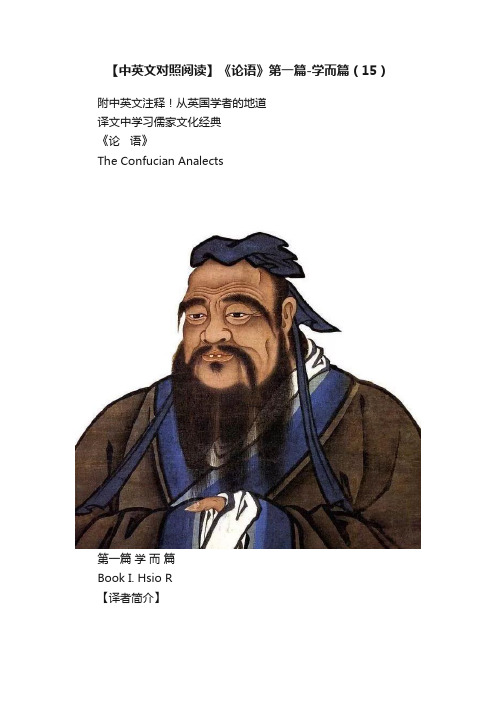
【中英文对照阅读】《论语》第一篇-学而篇(15)附中英文注释!从英国学者的地道译文中学习儒家文化经典《论语》The Confucian Analects第一篇学而篇Book I. Hsio R【译者简介】理雅各(James Legge,1815年-1897年)是近代英国著名汉学家,曾任香港英华书院校长,伦敦布道会传教士。
他是第一个系统研究、翻译中国古代经典的人,从1861年到1886年的25年间,将《四书》、《五经》等中国主要典籍全部译出,共计28卷。
当他离开中国时,已是著作等身。
理雅格的多卷本《中国经典》、《法显行传》、《中国的宗教:儒教、道教与基督教的对比》和《中国编年史》等著作在西方汉学界占有重要地位。
他与法国学者顾赛芬、德国学者卫礼贤并称汉籍欧译三大师,也是儒莲翻译奖的第一个获得者。
【本篇引语】《学而》是《论语》第一篇的篇名。
《论语》中各篇一般都是以第一章的前二三个字作为该篇的篇名。
《学而》一篇包括16章,内容涉及诸多方面。
其中重点是“吾日三省吾身”;“节用而爱人,使民以时”;“礼之用,和为贵”以及仁、孝、信等道德范畴。
【原文】1·16 子曰:“不患(1)人(2)之不己知,患不知人也。
”【英文】The Master said, ”I will not be afflicted at men’s not knowing me; I will be afflicted that I do not know men.”afflict 使苦恼【译文】孔子说:“不怕别人不了解自己,只怕自己不了解别人。
”【注释】(1)患:忧虑、怕。
(2)人:指有教养、有知识的人,而非民。
【评析】这段话是孔子对自己学生所传授的为人处世之道。
有的解释者说,这是孔子安贫乐道、不求名位的思想。
这种解释可能不妥。
这不符合孔子一贯的主张。
在孔子的观念中,“学而优则仕,是一种积极入世的态度。
这里的潜台词是:在了解别人的过程中,也使别人了解自己。
《论语》英文版
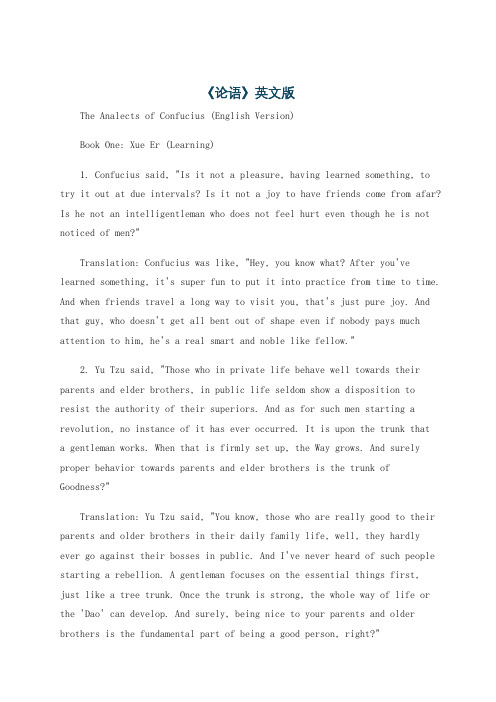
《论语》英文版The Analects of Confucius (English Version)Book One: Xue Er (Learning)1. Confucius said, "Is it not a pleasure, having learned something, to try it out at due intervals? Is it not a joy to have friends come from afar? Is he not an intelligentleman who does not feel hurt even though he is not noticed of men?"Translation: Confucius was like, "Hey, you know what? After you've learned something, it's super fun to put it into practice from time to time. And when friends travel a long way to visit you, that's just pure joy. And that guy, who doesn't get all bent out of shape even if nobody pays much attention to him, he's a real smart and noble like fellow."2. Yu Tzu said, "Those who in private life behave well towards their parents and elder brothers, in public life seldom show a disposition to resist the authority of their superiors. And as for such men starting a revolution, no instance of it has ever occurred. It is upon the trunk thata gentleman works. When that is firmly set up, the Way grows. And surely proper behavior towards parents and elder brothers is the trunk of Goodness?"Translation: Yu Tzu said, "You know, those who are really good to their parents and older brothers in their daily family life, well, they hardly ever go against their bosses in public. And I've never heard of such people starting a rebellion. A gentleman focuses on the essential things first,just like a tree trunk. Once the trunk is strong, the whole way of life or the 'Dao' can develop. And surely, being nice to your parents and older brothers is the fundamental part of being a good person, right?"Book Two: Wei Zheng (The Practice of Government)1. Confucius said, "Guide them by edicts, keep them in line with punishments, and the common people will stay out of trouble but will have no sense of shame. Guide them by virtue, keep them in line with the rites, and they will, besides having a sense of shame, reform themselves."Translation: Confucius said, "If you just boss people around with laws and scare them with punishments, the ordinary folks will avoid getting into trouble, but they won't really feel ashamed of doing wrong. But if you lead them with good morals and make them follow proper etiquettes, not only will they feel ashamed when they do wrong, but they'll also correct themselves."2. Ji Kangzi asked Confucius about government, saying, "What would you think if, in order to move closer to those who possess the Way, I were to kill those who do not follow the Way?" Confucius replied, "In administering your government, what need is there for you to kill? Just desire the good yourself and the common people will be good. The moral character of the ruler is like wind and that of the common people is like grass. In whatever direction the wind blows, the grass always bends."Translation: Ji Kangzi asked Confucius about how to run a government. He said, "Hey, Confucius, what if I killed those who don't follow the right path so that I can get closer to those who are on the right track?" Confucius was like, "Dude, when you're running the government, why do you need to kill? If you just want good things yourself, the common people will be good too. The ruler's moral quality is like the wind, and the common people are like grass. No matter which way the wind blows, the grass will always bend in that direction."。
论语原文及翻译
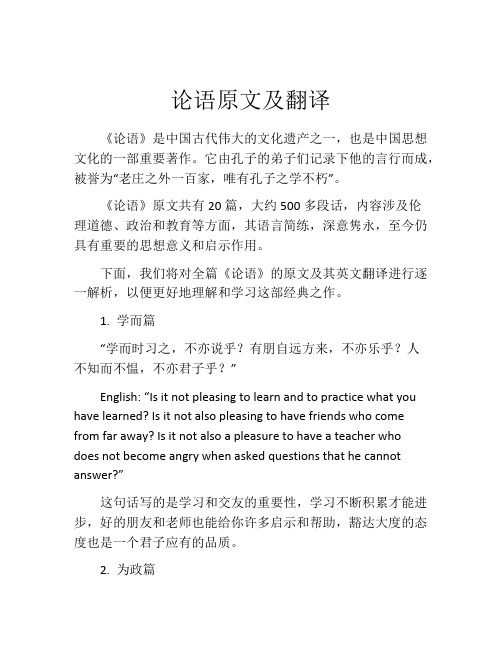
论语原文及翻译《论语》是中国古代伟大的文化遗产之一,也是中国思想文化的一部重要著作。
它由孔子的弟子们记录下他的言行而成,被誉为“老庄之外一百家,唯有孔子之学不朽”。
《论语》原文共有20篇,大约500多段话,内容涉及伦理道德、政治和教育等方面,其语言简练,深意隽永,至今仍具有重要的思想意义和启示作用。
下面,我们将对全篇《论语》的原文及其英文翻译进行逐一解析,以便更好地理解和学习这部经典之作。
1. 学而篇“学而时习之,不亦说乎?有朋自远方来,不亦乐乎?人不知而不愠,不亦君子乎?”English: “Is it not pleasing to learn and to practice what you have learned? Is it not also pleasing to have friends who come from far away? Is it not also a pleasure to have a teacher who does not become angry when asked questions that he cannot answer?”这句话写的是学习和交友的重要性,学习不断积累才能进步,好的朋友和老师也能给你许多启示和帮助,豁达大度的态度也是一个君子应有的品质。
2. 为政篇“见贤思齐焉,见不贤而内自省也。
”English: “When you see someone who is virtuous, think of becoming like her. When you see someone who is not virtuous, examine yourself within.”在治理国家的事务中,要学会尊重和借鉴他人的优点,同时更要反思自己存在的不足和错误。
这也是一种成长的方式,为政者只有不断完善自己,才能更好地执政。
3. 八佾篇“君子坦荡荡,小人长戚戚。
《论语》学而第一带拼音和译文

《论语》学而第一1.子z ǐ 曰yu ē:“学xu é 而ér 时sh í 习x í 之zh ī ,不b ú 亦y ì 说yu è 乎h ū?有y ǒu 朋 p éng 自z ì 远yu ǎn 方f āng 来l ái ,不b ú 亦y ì 乐l è 乎h ū?人r én 不b ù 知zh ī ,而ér 不b ú 愠y ùn ,不b ú 亦y ì 君j ūn 子z ǐ乎h ū?”【译】孔子说:“学了又时常温习和练习,不是很愉快吗?有志同道合的人从远方来,不是很令人高兴的吗?人家不了解我,我也不怨恨、恼怒,不也是一个有德的君子吗?” 2.有y ǒu 子z ǐ 曰yu ē :“其q í 为w éi 人r én 也y ě 孝xi ào 弟t ì,而ér 好h ào 犯f àn 上sh àng 者zh ě,鲜xi ǎn 矣y ǐ ;不b ú 好h ào 犯f àn上sh àng,而ér 好h ào 作zu ó 乱lu àn 者zh ě ,未w èi 之zh ī 有y ǒu也y ě 。
君j ūn 子z ǐ 务w ù 本b ěn ,本b ěn 立l ì 而ér 道d ào生sh ēng 。
孝xi ào 弟t ì 也y ě 者zh ě ,其q í 为w éi 仁r én 之zh ī 本b ěn 与y ú!”【译】有子说:“孝顺父母,顺从兄长,而喜好触犯上层统治者,这样的人是很少见的。
《论语》英译
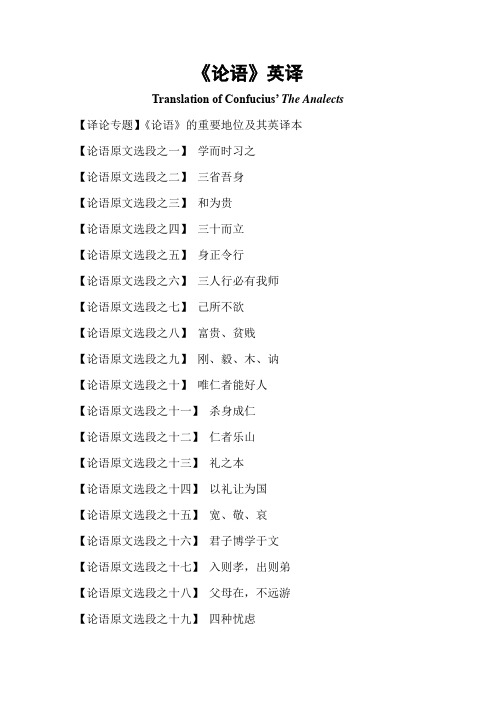
《论语》英译Translation of Confucius’ The Analects 【译论专题】《论语》的重要地位及其英译本【论语原文选段之一】学而时习之【论语原文选段之二】三省吾身【论语原文选段之三】和为贵【论语原文选段之四】三十而立【论语原文选段之五】身正令行【论语原文选段之六】三人行必有我师【论语原文选段之七】己所不欲【论语原文选段之八】富贵、贫贱【论语原文选段之九】刚、毅、木、讷【论语原文选段之十】唯仁者能好人【论语原文选段之十一】杀身成仁【论语原文选段之十二】仁者乐山【论语原文选段之十三】礼之本【论语原文选段之十四】以礼让为国【论语原文选段之十五】宽、敬、哀【论语原文选段之十六】君子博学于文【论语原文选段之十七】入则孝,出则弟【论语原文选段之十八】父母在,不远游【论语原文选段之十九】四种忧虑【论语原文选段之二十】有益、有损之乐【论语原文选段之二十一】见贤思齐【论语原文选段之二十二】不患无位【论语原文选段之二十三】人无远虑,必有近忧【论语原文选段之二十四】自责与责人【论语原文选段之二十五】有过应改【论语原文选段之二十六】松柏后凋【论语原文选段之二十七】君子重义【论语原文选段之二十八】君子周而不比【论语原文选段之二十九】君子和而不同【论语原文选段之三十】君子坦荡荡【论语原文选段之三十一】欲速则不达【论语原文选段之三十二】有教无类【论语原文选段之三十三】性相近,习相远【论语原文选段之三十四】学与思【论语原文选段之三十五】温故知新【论语原文选段之三十六】匹夫不可夺志【论语原文选段之三十七】知与不知【论语原文选段之三十八】讷于言,敏于行【论语原文选段之三十九】言与行【论语原文选段之四十】人与言【论语原文选段之四十一】学而不厌,诲人不倦【论语原文选段之四十二】见义不为,无勇也【译论专题】《论语》的重要地位及其英译本《论语》是中国传统文化宝库中一颗最绚丽夺目的明珠。
早在距今两千四百多年前的春秋末年和战国初期,这颗明珠即已熠熠发光。
《论语》中英对照(理雅各译)

論語Confucian AnalectsJames Legge ,1893學而第一Book I: Hsio RChapter 1子曰:“學而時習之,不亦說乎?有朋自遠方來,不亦樂乎?人不知而不慍,不亦君子乎?”The whole work and achievement of the learner, first perfecting his knowledge, then attracting by his fame like-minded individuals, and finally complete in himself.1. The Master said, "Is it not pleasant to learn with a constant perseverance and application?2. "Is it not delightful to have friends coming from distant quarters?3. "Is he not a man of complete virtue, who feels no discomposure though men may take no note of him?"achievement [əˈtʃi:vmənt] n.完成;成就perfect[ˈpɜ:fɪkt] v.使完善;使完备;使完美attract [əˈtrækt]vt.吸引;引起…的好感fame [feɪm] n.名声;名望like-minded [laɪk 'maɪndɪd] adj.志趣相投的individuals [ɪndɪ'vɪdʒʊəlz] n. [口语]人;某种类型的人constant [ˈkɒnstənt] adj. 不断的,持续的,始终如一的perseverance [ˌpɜ:sɪˈvɪərəns]n.毅力;韧性;不屈不挠的精神delightful [dɪˈlaɪtfl] adj. 令人高兴的;令人愉快的;宜人的distant [ˈdɪstənt] adj. 遥远的,远离的quarter [ˈkwɔ:tə(r)] n. 地区virtue [ˈvɜ:tʃu:] n. 美德;德行;价值discomposure [ˌdɪskəm'pəʊʒə(r)] n. 心乱,不安take note of 注意,留意Chapter 2有子曰:“其爲人也孝弟,而好犯上者,鮮矣。
《论语》中英文对照一辜鸿铭译

《论语》中英文对照一辜鸿铭译CHAPTER 1【第一章】子曰、學而時習之、不亦說乎。
有朋自遠方來、不亦樂乎。
人不知而不慍、不亦君子乎。
1. Confucius remarked, “ it is indeed a pleasure to acquire knowledge and, as you go on acquiring, to put into practice what you have acquired. A greater pleasure still it is when friends of congenial minds come from afar to seek you because of your attainments. But he is truly a wise and good man who feels no discomposure even when he is not noticed of men.”【第二章】有子曰、其為人也孝弟、而好犯上者鮮矣、不好犯上、而好作亂者、未之有也。
君子務本、本立、而道生、孝弟也者、其為仁之本與。
2. A dis ciple of Confucius remarked,” A man who is a good son and a good citizen will seldom be found to be a man disposed to quarrel with those in authority over him; and men who are disposed to quarrel with those in authority will never be found to disturb the peace and order of the State.“A wise man devotes his attention to what is essential in the foundation of life. When the foundation is laid, wisdom will come. Now, to be a good son and a good citizen- do not these form thefoundation of a moral life?”【第三章】子曰、巧言令色、鮮矣仁。
《论语》原文完整版注音注释翻译
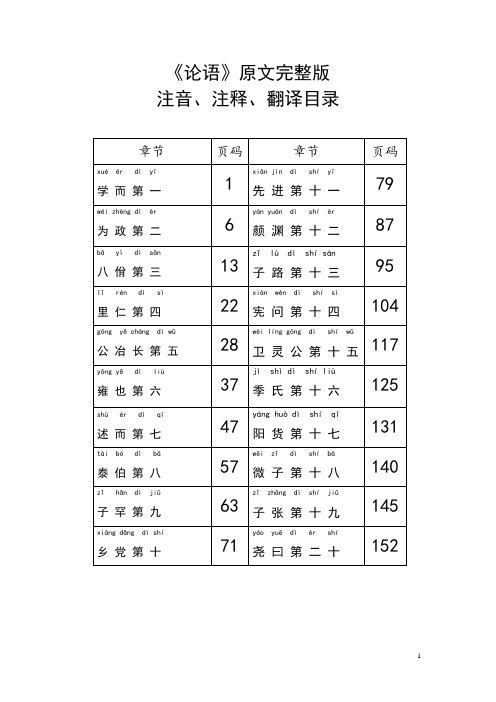
《论语》原文完整版注音、注释、翻译目录1第一章论语学而篇zǐ yuē xuéér shí xí zhī bù yì yuè hū yǒu péng zì yuǎn fāng子曰: 学而时习之,不亦悦乎。
有朋自远方lái bú yì lè hūr én bù zhīér bú yùn bú yì jūn zǐ hū来,不亦乐乎。
人不知而不愠,不亦君子乎。
【注释】子:《论语》中“子曰”的“子”都是孔子的学生对孔子的敬称。
时:时时,经常。
习:演习,复习。
说:同“悦”,高兴。
愠(yùn):恼怒,怨恨。
【大意】孔子说:“学了,又经常复习它,不也是高兴的吗?有朋友从远方来,不也是快乐的吗?人家不了解我,我也不怨恨,不也是君子吗?”yǒu zǐ yuē qí wéi rén yě xiào tìér hào fàn shàng zhě xiǎn yǐ有子曰:其为人也孝悌,而好犯上者,鲜矣;bù hào fàn shàng ér hào zuò luàn zhě wèi zhī yǒu yě jūn zǐ wù běn不好犯上,而好作乱者,未之有也。
君子务本,běn lìér dào shēng xiào tì yě zhě qí wéi rén zhī běn yú本立而道生;孝悌也者,其为仁之本欤。
【注释】有子:孔子的学生,姓有,名若。
- 1、下载文档前请自行甄别文档内容的完整性,平台不提供额外的编辑、内容补充、找答案等附加服务。
- 2、"仅部分预览"的文档,不可在线预览部分如存在完整性等问题,可反馈申请退款(可完整预览的文档不适用该条件!)。
- 3、如文档侵犯您的权益,请联系客服反馈,我们会尽快为您处理(人工客服工作时间:9:00-18:30)。
⒈3 子曰:“巧言令 色,鲜矣仁!”
⒈4 曾子曰:“吾日三 省吾身——为人谋而不 忠乎?于朋友交而不信 乎?传不习乎?”
⒈5 子曰:“道千 乘之国,敬事而信, 节用而爱人,使民 以时。”
⒈6 子曰:“弟子, 入则孝,出则悌, 谨而信,凡爱众, 而亲仁。行有余力, 则以学文。”
⒈7子夏曰:“贤贤易 色;事父母,能竭其力; 事君,能致其身;于朋 友交,言而有信。虽曰 未学,吾必谓之学矣。”
⒈12有子曰:“礼之用, 和为贵。先王之道,斯为 美;小大由之。有所不行, 知和而和,不以礼节之,可复也。 恭近於礼,远耻辱 也。因不失其亲, 亦可宗也。”
⒈14子曰:“君子食 无求饱,居无求安, 敏於事而慎於言,就 有道而正焉,可谓好 学也已。”
3. 'Is he not a man of complete virtue, who feels no discomposure though men may take no note of him?'
⒈2有子曰:“其为人也 孝弟,而好犯上者,鲜矣; 不好犯上,而好作乱者, 未之有也。君子务本,本 立而道生。孝弟也者,其
⒈8子曰:“君子 不重,则不威;学 则不固。主忠信。 无友不如己者。过, 则勿惮改。”
⒈9 曾子曰:慎终, 追远,民德归厚矣。
⒈10 子禽问於子贡曰:“夫 子至於是邦也,必闻其政,求 之与?抑与之与?” 子贡曰:“夫子温、良、恭、 俭、让以得之。夫子之求之也, 其诸异乎人之求之与?”
⒈11 子曰:“父在, 观其志;父没,观其 行;三年无改於父之 道,可谓孝矣。”
⒈15 子贡曰:贫而无 谄,富而无骄,何如? 子曰:“可也;未若贫 而乐,富而好礼者也。
子贡曰:“诗云:‘如切 如磋,如琢如磨’,其斯 之谓与?” 子曰:“赐也,可与言诗 已矣,告诸往而知来者。”
⒈16 子曰:“不 患人之不己之, 患不知人也。”
论语·学而第一
⒈1子曰:学而时习 之,不亦说乎? 有朋自远方来,不亦 乐乎? 人不知而不愠,不亦 君子乎?
The Master said, 'Is it not pleasant to learn with a constant perseverance and application?
2. 'Is it not delightful to have friends coming from distant quarters?'
